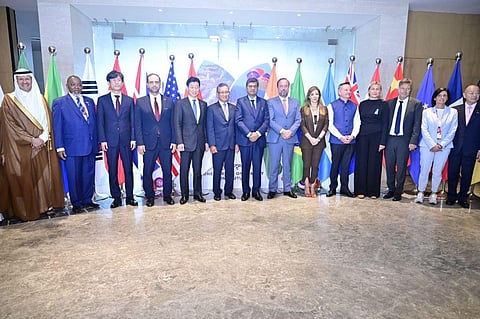

The Group of 20 energy ministers’ meeting concluded in Goa on July 22, 2023, with the final summary failing to include language on the phase-down of unabated fossil fuels.
The ambiguous language on the phase-down of unabated fossil fuels used in the outcome document of the G20 Energy Transition Working Group (ETWG) raised concerns among experts.
The G20 energy ministers met under India’s presidency with the theme ‘One Earth, One Family, One Future’, released an outcome document and chair’s summary.
The text just called for a tripling of clean technology capacity as opposed to the initial deliberations that focused on tripling renewable energy (RE).
As expected, India had to settle for language; for example, a tripling of RE has been changed to “tripling of clean technology capacity,” said Tarun Gopalakrishnan, pre-doctoral fellow, Climate Policy Lab, Centre for International Environment Policy.
Efforts towards phasing down of all fossil fuels have been watered down. This has been the best diplomatic solution but not the best climate policy solution, Gopalakrishnan added.
Furthermore, the document endorsed zero- and low-emission hydrogen. “We aim to support the acceleration of production, utilisation, as well as the development of transparent and resilient global markets for hydrogen produced from zero and low-emission technologies and its derivatives such as ammonia by developing voluntary and mutually agreed harmonising standards as well as mutually recognised and interoperable certification schemes.”
“We recognise that cooperation among G20 members would be crucial to accelerate technology development and large-scale deployment of hydrogen and its derivatives such as ammonia while reducing costs. In this regard, we note, the Presidency’s initiative to establish, the Green Hydrogen Innovation Centre steered by International solar Alliance,” the document read.
All the G20 ministers responsible for energy acknowledged the report Low-cost Financing for the Energy Transition under the Indian presidency. It had estimated that the world needs an annual investment of over $4 trillion, with a high share of RE in the primary energy mix.
“G20 will work towards facilitating access to low-cost finance for existing as well as new and emerging clean and sustainable energy technologies for supporting the energy transitions,” the summary document said. It acknowledged “that certain minerals, materials and technologies are critical for energy transitions.
There is a need to maintain a reliable and sustainable supply chain of critical minerals and materials, as well as semiconductors and related technologies, complying with the principles of market economy and international trade rules while respecting the sovereign rights of countries, the report added.
G20 countries urgently need to uphold their commitment to eliminate inefficient fossil fuel subsidies that exceeded $1 trillion globally in 2022, said Siddharth Goel, senior policy advisor, International Institute for Sustainable Development.
“What’s more, the final statement promotes ‘low-emissions’ technologies to produce hydrogen, opening up the risk of using fossil-based sources for its production,” Goel said.
Such “low-carbon” solutions are a distraction from a fossil fuel phase-down that is indispensable to limit the effect of global warming, he added.
Nuclear power, especially small modular reactors, prominently featured in the text, marking a comeback.
“The countries that opt to use civil nuclear energy reaffirm its role in providing clean energy contributing to GHG emissions reduction, achieving the United-Nations-mandated Sustainable Development Goal-7 and energy security, ensuring safety and resilient infrastructure and contributing to baseload power and grid flexibility along with nonelectrical applications such as industrial heating and hydrogen production,” the document said.
The countries plan to collaborate, on voluntary and mutually agreed terms, in research, innovation, development and deployment of civil nuclear technologies, including advanced and small modular reactors, which are being readied for deployment and building resilient nuclear supply chains, including nuclear fuel, through public and private partnership, where appropriate and in accordance with national legislation and upholding International Atomic Energy Agency’s high standards of nuclear safety, security, and safeguards, the document added.
“These countries intend to promote responsible nuclear decommissioning and radioactive waste and spent fuel management and mobilising investments and share knowledge and best practices, through strengthening international cooperation to promote nuclear safety globally,” the document said.
The G20 countries also strongly condemned the Ukraine War and said that it exacerbated “existing fragilities in the global economy.”